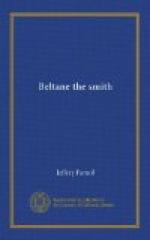“Art thou he whom men call Beltane the Smith?”
He answered, gazing at her lowered lashes:
“I am Beltane the Smith.”
For a space she sat grave and silent, then looked at him with eyes that laughed ’neath level brows to see the wonder in his gaze. But anon she falls a-sighing, and braided a tress of hair ’twixt white fingers ere she spoke:
“’Tis said of thee that thou art a hermit and live alone within these solitudes. And yet—meseemeth—thine eyes are not a hermit’s eyes, messire!”
Quoth Beltane, with flushing cheek and eyes abased:
“Yet do I live alone, lady.”
“Nor are thy ways and speech the ways of common smith, messire.”
“Yet smith am I in sooth, lady, and therewithal content.”
Now did she look on him ’neath drooping lash, sweet-eyed and languorous, and shook her head, and sighed.
“Alas, messire, methinks then perchance it may be true that thou, for all thy youth, and despite thine eyes, art a mocker of love, a despiser of women? And yet—nay—sure ’tis not so?”
Then did Beltane the strong come nigh to fear, by reason of her fair womanhood, and looked from her to earth, from earth to sky, and, when he would have answered, fell a-stammering, abashed by her wondrous beauty.
“Nay lady, indeed—indeed I know of women nought—nought of myself, but I have heard tell that they be—light-minded, using their beauty but to lure the souls of men from high and noble things—making of love a jest—a sport and pastime—” But now the Duchess laughed, very soft and sweeter, far, to Beltane’s thinking than the rippling music of any brook, soever.
“Aye me, messire anchorite,” said she smiling yet, “whence had you this poor folly?”
Quoth Beltane gravely:
“Lady, ’twas from one beyond all thought wise and learned. A most holy hermit—”
“A hermit!” says she, merry-eyed, “then, an he told thee this, needs must he be old, and cold, and withered, and beyond the age of love, knowing nought of women save what memory doth haunt his evil past. But young art thou and strong, and should love come to thee—as come, methinks, it may, hearken to no voice but the pleading of thine own true heart. Messire,” she sighed, “art very blind, methinks, for you sing the wonders of these forest-lands, yet in thy song is never a word of love! O blind! O blind! for I tell thee nought exists in this great world but by love. Behold now, these sighing trees love their lord the sun, and, through the drear winter, wait his coming with wide-stretched, yearning arms, crying aloud to him in every shuddering blast the tale of their great longing. And, after some while, he comes, and at his advent they clothe themselves anew in all their beauty, and with his warm breath thrilling through each fibre, put forth their buds, singing through all their myriad leaves the song of their rejoicing. Something the like of this, messire, is the love a woman beareth to a man, the which, until he hath felt it trembling in his heart, he hath not known the joy of living.”




